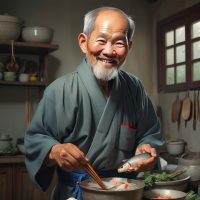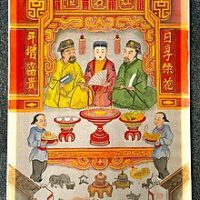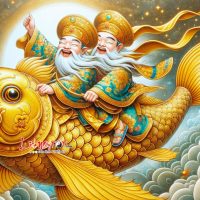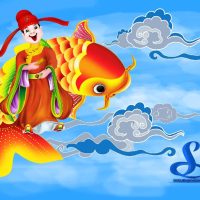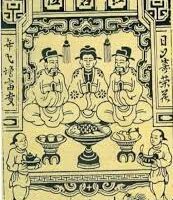Ong Tao : The Kitchen God
Listen
At a glance
| Description | |
|---|---|
| Origin | Vietnamese Mythology |
| Classification | Gods |
| Family Members | N/A |
| Region | Vietnam |
| Associated With | Kitchen, Household |
Ong Tao
Introduction
Within Vietnamese mythology, a tapestry of deities, heroes, and mythical beings unfolds, each character contributing to the rich cultural landscape. Amidst this pantheon, Ong Tao emerges as a notable figure, intricately woven into the fabric of Vietnamese customs and beliefs. Revered as the Kitchen God, Ong Tao commands reverence and respect, his presence permeating both the spiritual and domestic realms. Annually, intricate rituals pay homage to this divine guardian, underscoring his enduring influence on Vietnamese folklore. At the heart of Vietnamese households, amidst the aromatic symphony of culinary creation, Ong Tao reigns supreme. Known interchangeably as Ông Táo, this revered guardian spirit embodies a fusion of celestial duty and earthly familiarity. Serving as the conduit between mortal life and the divine, Ong Tao’s significance transcends mere myth; he is a cherished advocate for Vietnamese families, bridging the gap between heaven and earth with grace and solemnity.
Physical Traits
Though no specific physical attributes are universally associated with Ong Tao, glimpses of his form emerge through traditional depictions, particularly in Dong Ho paintings. Crafted by artist Doan Thanh Loc, these watercolor masterpieces capture the essence of the Three Kitchen Gods, including Ong Tao. Across various renditions, Ong Tao assumes the visage of an elder, his countenance marked by wisdom and benevolence. Draped in customary Vietnamese attire, embellished with symbols of prosperity and abundance, Ong Tao’s portrayal reflects his role as a guardian of households and custodian of familial welfare.
Unlike deities often depicted in grandeur, Ong Tao exudes approachability, his gentle features and warm gaze inviting reverence rather than fear. Clad in attire ranging from humble garb to scholarly robes, his appearance echoes the diversity of Vietnamese life. Through subtle nuances, such as the presence of a writing brush and paper, artists signify Ong Tao’s role as a chronicler, diligently recording the deeds and offerings of families throughout time.
Family
The story of Ong Tao is a poignant narrative of love and sacrifice, woven with tragedy and redemption. It revolves around a couple, Trong Cao and his wife Thi Nhi, who remained childless after many years of marriage. Following a heated dispute, Trong Cao expelled his wife from their home, leading Thi Nhi to find solace in the arms of a compassionate man named Pham Lang, whom she eventually married. When Trong Cao, consumed by remorse, discovered their newfound happiness, a sequence of calamitous events ensued, resulting in the demise of all three individuals. Transformed by destiny, they were reborn as the three hearthstones encircling the cooking fire, assuming the mantle of Kitchen Gods.
In Vietnamese folklore, Ong Tao is often accompanied by his consort, the Kitchen Goddess or Tet Tao. Together, they constitute a divine pair entrusted with the guardianship of the kitchen and the sanctuary of the home. The Kitchen Goddess serves as Ong Tao’s steadfast companion, lending her assistance in his sacred duties and sharing his benevolent essence.
While commonly referred to as Ong Tao, denoting him in singular form, Vietnamese mythology presents a nuanced perspective. The responsibility of overseeing the kitchen and acting as intermediaries with the celestial realm does not rest solely on an individual deity but on Táo Quân, a triad of divine beings. Each member of Táo Quân embodies a distinct virtue: Táo Vị (The Hearth Spirit), tasked with monitoring the family’s conduct and transmitting their deeds to the heavens; Táo Thực (The Food Spirit), who supervises the kitchen’s affairs, ensuring the quality and purity of meals prepared; and Táo Tịch (The Expenditure Spirit), who vigilantly observes the family’s financial affairs and expenditure patterns.
Collectively, this triumvirate epitomizes the holistic prosperity of the household, encompassing moral integrity, culinary excellence, and fiscal prudence.
Other names
Ong Tao, revered as the Kitchen God, answers to various appellations in Vietnamese folklore, each name resonating with distinct cultural significance. While Ong Tao predominates as the favored designation for this deity, alternative titles such as Táo Quân, Táo Vương, Thần Bếp, and Vua Bếp also grace his divine persona. The epithet “Táo Quân,” translating to the Kitchen God, underscores his close association with domestic affairs, affirming his role as the guardian of households. Similarly, “Thần Bếp” or “Thần Chúng Sợi” accentuate his celestial ties to culinary realms and his potent influence over familial destinies. Embracing a tapestry of names, Ong Tao embodies the multifaceted nature of Vietnamese spirituality, transcending singular identity to manifest as the embodiment of divine guardianship and providence. Among the myriad epithets, common variations include “Thần Bếp” (God of the Kitchen), “Vua Bếp” (King of the Kitchen), and “Táo Công” (Lord of the Kitchen), each imbued with regional nuances and historical contexts, enriching the tapestry of Vietnamese cultural heritage.
Powers and Abilities
In his revered role as the Kitchen God, Ong Tao assumes the solemn duty of overseeing all household affairs. An annual ritual, occurring on the 23rd day of the last lunar month, sees the Táo Quân departing the kitchen, riding upon a carp to the heavens to present a comprehensive report on each family’s conduct and deeds. While primarily a witness and recorder of household activities, Ong Tao is far from a passive observer. Endowed with certain powers and abilities, he actively contributes to the welfare of the family:
Ong Tao’s paramount power lies in his annual ascent to the celestial realm on the 23rd day of the 12th lunar month. There, he delivers a meticulous account of the family’s actions and character throughout the year, influencing the blessings and fortunes they shall receive in the forthcoming year. Some believe Ong Tao assumes the role of mediator between the family and the Jade Emperor, advocating for their prosperity and seeking forgiveness for minor transgressions. Ong Tao bestows blessings upon the kitchen, ensuring an abundance of food, robust health, and prosperity for the family.
Beyond his watchful gaze and meticulous record-keeping, Ong Tao possesses a myriad of abilities entwined with the fabric of domestic life. From discerning the virtuous from the errant within the household to serving as an intermediary with higher deities, he wields influence over matters of fertility, prosperity, and good fortune. Through acts of piety and reverence, families invite Ong Tao’s benevolence, securing his blessings for a harmonious and prosperous existence.
Modern Day Influence
In contemporary Vietnamese culture, Ong Tao remains a figure of reverence, his presence woven into the fabric of tradition. On the 23rd day of the final lunar month, folklore dictates that Ong Tao embarks on a celestial journey atop a carp, bearing witness to the affairs of the living. This time-honored tradition, known as “Tet Tao Quan” or Kitchen God Farewell, endures as a cherished custom across Vietnam.
During Tet Tao Quan, families meticulously prepare offerings of sweets and carp, symbolic tokens of gratitude and aspirations for blessings in the forthcoming year. This ritual serves not only as an expression of appreciation for Ong Tao’s protection and guidance but also as a conduit for seeking favor for the future. It symbolizes the reaffirmation of the familial bond and the anticipation of prosperity and fortune.
The influence of Ong Tao extends beyond the realm of ritual, permeating various facets of modern Vietnamese society. His image adorns artwork, decor, and religious artifacts, adorning homes, temples, and public spaces alike. Moreover, the preservation of culinary customs and the emphasis on familial unity underscore his enduring significance in Vietnamese culture.
Beyond his religious role, Ong Tao occupies a prominent place in popular culture, featuring prominently in folklore, proverbs, and contemporary media. This enduring presence serves as a testament to his status as a beloved and relatable figure, bridging the gap between tradition and modernity in Vietnamese society.
Related Images
Frequently Asked Questions
What is lorem Ipsum?
I am text block. Click edit button to change this text. Lorem ipsum dolor sit amet, consectetur adipiscing elit. Ut elit tellus, luctus nec ullamcorper mattis, pulvinar dapibus leo.
What is lorem Ipsum?
I am text block. Click edit button to change this text. Lorem ipsum dolor sit amet, consectetur adipiscing elit. Ut elit tellus, luctus nec ullamcorper mattis, pulvinar dapibus leo.
What is lorem Ipsum?
I am text block. Click edit button to change this text. Lorem ipsum dolor sit amet, consectetur adipiscing elit. Ut elit tellus, luctus nec ullamcorper mattis, pulvinar dapibus leo.
What is lorem Ipsum?
I am text block. Click edit button to change this text. Lorem ipsum dolor sit amet, consectetur adipiscing elit. Ut elit tellus, luctus nec ullamcorper mattis, pulvinar dapibus leo.
What is lorem Ipsum?
I am text block. Click edit button to change this text. Lorem ipsum dolor sit amet, consectetur adipiscing elit. Ut elit tellus, luctus nec ullamcorper mattis, pulvinar dapibus leo.

